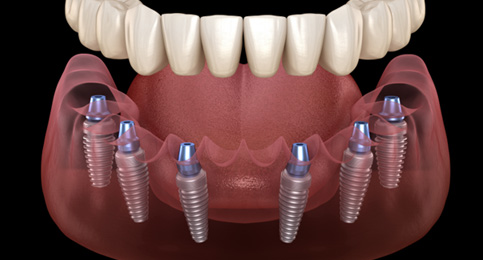Dentures – Reno, NV
A Reliable Solution for Multiple Missing Teeth
For centuries, people have been using dentures to replace their missing teeth. Thanks to advancements in modern dentistry, today’s dentures are made out of materials that are highly comfortable to wear and closely resemble your natural teeth. When you have extensive tooth loss to deal with, give Village Dental a call to schedule a consultation with Dr. Cercek or Dr. Rodriguez and find out whether dentures are the best tooth replacement solution in your case.
Why Choose Village Dental for Dentures?
- Partnered with Local Dental Implant Specialists
- Long-Lasting, Realistic-Looking Restorations
- In-Network with Most PPO Dental Insurance Plans
Who’s a Good Candidate for Dentures?

Dentures can be a suitable option for anyone who is missing either several teeth in one arch or an entire row of teeth. However, if only one or two teeth are missing, a dental bridge might be a better choice. Additionally, dentures require a sufficient amount of healthy gum tissue to support them. If you schedule a consultation at our office, we’ll examine your mouth and carefully consider your situation before we help you determine whether dentures are truly right for you.
Effects of Missing Teeth

Missing teeth can be a cosmetic annoyance, but did you know that they can also impact your oral health? If you don’t replace smile gaps quickly, any remaining pearly whites will start to shift in an effort to compensate. They could become crooked or even throw off your bite alignment and trigger jaw complications.
Another problem that can happen is jawbone shrinkage. Without a dental root to pass along important stimulation and encourage circulation, your jawbone will gradually deteriorate. This can lead to further tooth loss and tends to make facial features appear hollow.
Whether you need a full or partial replacement, dentures can help prevent dental shifting and slow the rate of jawbone shrinkage!
What Qualifies You for Dentures?

Most healthy adults are good candidates for dentures – as long as they have extensive tooth loss, that is.
You should know that existing conditions like tooth decay and gum disease could present challenges for dentures. Since your teeth and gums are likely to change shape in these situations, it’s better to treat the underlying problem first, then get fitted for your dentures. That way, you only have to get sized for them once, and you won’t run the risk of irritating sore teeth or gums.
It can be difficult to tell whether you have a compromising oral condition, but don’t worry. Our team will take care to thoroughly examine your mouth during your consultation so you can avoid troublesome issues.
Alternative Tooth-Replacement Options

If dentures aren’t right for you and your smile, there are other options that could be just as or more effective. Dental bridges, for example, are a great solution for patients missing one or more teeth in a row. Dental implants are even more versatile – you can replace a singular gap with one implant, fill one or both arches, or receive a combined prosthetic with all-on-4 implants or implant dentures.
Basically, if you need to replace missing teeth, we can personalize your restorative treatment so you end up with the best, most seamless replacement for your smile!
Types of Dentures

“Getting dentures” doesn’t mean exactly the same thing for everyone; there are multiple kinds of dentures to choose from. Our team can review the available options with you and make a recommendation based on your needs; we can also give you an estimate of how much your new teeth will cost.
Partial Dentures
Partial dentures are used when only some of your teeth are missing. They are designed to fit snugly into the gaps in your smile, and they are attached to your remaining teeth using clasps. The base of your partial dentures will be colored to match your gums, and the teeth they support will be shaded to blend in with the rest of your smile.
Full Dentures
A full denture is necessary when you have either lost all of your teeth or if you don’t have enough healthy natural teeth remaining in the arch. Full dentures are made out of the same lifelike materials as partial dentures, but instead of using clasps, they are designed to stay on your teeth via natural suction; you can also use denture adhesive to help them stay in place.
Implant Dentures
Dental implants are surgically placed in your jawbone so that they can mimic the roots of your natural teeth. When dentures are anchored to implant posts, they will not slip, and they’ll be able to handle most foods. While traditional partial dentures and full dentures are removable, implant dentures can be made to stay in your mouth at all times.
How Dentures Are Made

If you’re excited about receiving a new set of dentures, you may be interested in knowing about how these amazing and functional prosthetic devices are made. Here’s a brief guide to how the team at Village Dental can craft a lifelike set of dentures that fits comfortably and restores much of your chewing ability.
What Are Dentures Made Of?

A denture is made of two primary components. These are:
The base: This structure serves to hold the device in place in the mouth while supporting the artificial teeth during smiling and chewing. The base may be made from nylon, porcelain, resin, or metal, and full dentures are usually made from acrylic since it can be shaded to match the shade of your natural gum tissue. The bases of partial dentures may also incorporate metal clips designed to connect with the patient’s remaining natural teeth.
The artificial teeth: These are typically made from resin or porcelain to give them durability and a beautiful and lifelike appearance. Porcelain is usually only recommended for full dentures since it can be abrasive on the enamel of neighboring teeth.
The Denture Creation Process

Each denture is completely customized for the patient’s mouth through this process:
- Step 1: Our dentist takes impressions of your bite to create a plaster replica of your mouth.
- Step 2: This replica is sent to a trusted dental lab where a skilled technician uses it to create a wax model of your gumline.
- Step 3: Artificial teeth made from acrylic resin are placed in the wax using a device called an articulator. The technician will then sculpt the dentures to match your gumline.
- Step 4: The wax dentures are sent back to our office so you can try them on. If they’re approved, they’ll be sent back to the lab for finalization.
- Step 5: The technician places the wax dentures in a flask to hold them in place and covers them with plaster. Then, they will boil the flask to eliminate the wax portions, creating a negative mold for your final restoration.
- Step 6: After making holes in the teeth so they can attach to the restoration, the technician injects acrylic into the flask. This material fills the spaces that were occupied by the wax, forming the bases of your final dentures.
- Step 7: The technician removes the plaster and places the dentures in an ultrasonic bath to remove any lingering material.
- Step 8: After trimming any excessive acrylic from the restoration, the technician will polish it to perfection.
- Step 9: Your completed denture will arrive at our office. After you try them on, we’ll make any final adjustments and send you on your way to enjoy your new smile.
Adjusting to Your New Dentures

While it’s perfectly normal to experience some discomfort and awkwardness when you first start wearing dentures, this should go away as you get used to wearing them. You can accelerate your adjustment period by sticking to a soft diet until you can handle tougher fare comfortably, exercising your facial muscles, experimenting with adhesive products, or reading a favorite book out loud while pausing to repeat troublesome words. Eventually, your restorations should feel very much like your natural teeth, and you should be able to speak easily and clearly with them. However, contact our office if your discomfort seems to be getting worse so we can make any necessary adjustments.
The Benefits of Dentures

The loss of multiple teeth can make many activities of daily life such as chewing and speaking more difficult while also leaving a person less willing to smile confidently. Thankfully, dentures can significantly improve a patient’s quality of life by addressing these and a host of other issues. Here’s a brief guide to the benefits that come with dentures from Village Dental.
Psychological Benefits

Complete tooth loss can be difficult to accept and leave patients with lower self-esteem and diminished willingness to engage socially. This can leave an individual more vulnerable to mental health issues like isolation and depression. Restoring the function and appearance of your smile with dentures can also restore your confidence and self-image by improving your appearance as well as your chewing and speaking ability.
Clearer Enunciation

Tooth loss can alter the way air moves about the mouth during speech, which can affect the ways words are pronounced. Since dentures work in the place of your missing teeth, they can make it much easier to speak clearly. While it can take some time to get used to speaking with dentures, you should be able to form words clearly and easily after you get a little practice.
Improves Nutrition

Many nutritious foods are quite fibrous, which can make them difficult to chew with traditional dentures and bridges. Tooth loss can increase a patient’s risk of issues like indigestion and malnutrition, but dentures can allow a patient to enjoy a wide variety of healthy foods such as crunchy nuts, snappy raw fruits and veggies, and fresh meat.
Preserves Oral Health

Tooth loss can lead to a host of oral health issues such as gum injuries, uneven dental wear, and misalignments due to the remaining teeth shifting out of place. Dentures can allow your teeth to distribute the pressure of chewing more evenly among themselves while protecting the gums from harmful food debris. These appliances can also help hold the remaining teeth in place, which can keep them in better alignment and less vulnerable to dental drift.
Expands Opportunities

A 2019 study found that people with poor oral health were less likely to be employed. A person’s smile is one of the first things other people notice about them, and having a grin you can be proud of can make it much easier to make a stellar first impression in social situations or at job interviews. Restoring your teeth with dentures may also help you land a juicy promotion.
Dentures Aftercare

Your new dentures were designed to transform the appearance and function of your smile, but even if you have only a few or no remaining natural teeth, you should continue attending your regular dental checkups.
At these appointments, your dentist will continue to keep a close eye on any remaining teeth and your gum tissue, as well as any abnormalities that could indicate oral cancer. It can be very difficult to notice these changes if you have dentures, so visiting Village Dental regularly is essential for early detection.
Removeable Dentures

Remove After Eating
After each meal, be sure to remove and rinse off your dentures. This will help prevent the buildup of food and debris on the prosthetics. Never use hot water to clean your dentures, as this can warp them and cause them to stop fitting properly.
Clean Your Restoration
Be sure to remove your dentures from your mouth to clean them. Using a soft-bristled toothbrush and a small amount of unscented hand soap, mild dish soap, or denture cleanser, gently brush the entire surface of your prosthetic.
Never clean your dentures with regular toothpaste, as they are not meant to stand up to abrasive products. If you are done wearing them for a while, place your dentures in a container of water or denture-cleansing solution so they don’t dry out and lose their shape.
Always rinse your dentures well before returning them to your mouth, as these cleansers are not meant to be ingested.
Keep Your Dentures Safe
When you clean your dentures, be sure to line the sink or countertop with a towel in case you accidentally drop them. This will cushion the impact and reduce the probability of damaging them.
Be sure to keep your dentures out of reach of small children and pets.
Remove When You Sleep
Remove your dentures each night before you go to bed. Wearing dentures restricts the circulation in your gums, which can cause soft-tissue irritation. Sleeping with dentures has been associated with an increased risk of pneumonia, as well as higher levels of gum and tongue plaque.
Be sure to store your dentures in a denture soaking solution or water overnight, as allowing them to dry out can cause them to permanently lose their shape.
Notice Changes
Regularly monitor your mouth for changes, including mouth sores, gum irritation, or signs of infection. If your dentures become damaged, do not attempt to repair them yourself. Instead, call Village Dental for assistance.
If your dentures begin shifting, clicking, or showing any other signs of improper fit, let us know, as they could need to be relined or replaced.
Understanding the Cost of Dentures

Dentures today aren’t like the ones that your grandparents used to wear. They are customized for each patient for optimal comfort and a natural appearance. Since everyone’s treatment process looks a little bit different, the cost can vary significantly. During your consultation with us, we will go over the estimated cost of your treatment in detail. Until then, here are some things to take into consideration.
Factors That Affect the Cost of Dentures

There are multiple factors that play a role in the cost of your dentures. Here are some of the most important ones.
- Preparation: If you require preliminary procedures, like gum disease treatment or tooth extractions, you should consider these costs as well.
- Material: Dentures can be crafted from multiple materials. They are all set at different price points.
- Type of Denture: In most cases, the bigger the prosthetic, the higher the cost. Implant dentures are priced higher because they require a surgical procedure.
Are Implant Dentures More Expensive?

Implant dentures have a higher cost than traditional dentures, and there is a good reason for it. Instead of being supported by the shape and suction of the mouth, implant dentures are supported by a number of strategically placed dental implants throughout the jawbone. This allows for additional stability, comfort, and longevity. To achieve this, getting dental implants requires a surgical procedure and many moths of healing, so the cost of treatment is higher. Implant dentures are made to last for multiple decades or even the rest of your smile.
Does Dental Insurance Cover Dentures?

Dentures are usually considered to be a “major restorative treatment,” so dental insurance providers will usually cover them up to 50% after the annual deductible has been met and before reaching the maximum. However, every insurance plan is a little bit different, so it is worthwhile to check with your provider ahead of time. We’d also be happy to help you with this. At our dental office, we gladly handle claims on your behalf, so you don’t need to worry about any of that paperwork.
Other Options for Making Dentures Affordable

If you don’t have dental insurance, this doesn’t mean that you will be left completely on your own. With our in-house saving plan, you can save on treatments completed at our practice. We are also happy to accept payments through CareCredit – a third-party financing company that can split the cost of your treatment into manageable monthly installments with little-to-no interest. If you have any questions or need help applying, give us a call so we can assist you.
Denture FAQs
Can Dentures Become Ill-Fitting?
The short answer is “yes.” That’s because they don’t prevent jawbone loss and, as it begins to change shape, your dentures will no longer fit snugly. Don’t worry – that doesn’t mean you have to deal with an ill-fitting restoration moving forward. In fact, it’s important that you don’t take the “wait and see” approach. Instead, you should get an appointment with us on the calendar so we can adjust them.
Can I Sleep with My Dentures?
Technically, you can sleep with your dentures. However, it’s not recommended because doing so can restrict blood flow, and it has been associated with a higher risk of pneumonia. That’s why we recommend taking them out and putting them in a glass of water at night!
Do Dentures Break Easily?
Dentures are crafted from only the best dental materials. So, you don’t have to worry – they aren’t flimsy. Of course, they aren’t indestructible either, so it’s important that you take the necessary precautions to protect them from harm, like cleaning them over a soft surface. In the event that they do break, don’t try to remedy the situation at home with superglue (it contains toxins that are not safe to ingest). Instead, schedule an appointment with us so we can assess the damage. From there, we can determine if your restoration can be repaired or if it needs to be replaced.
Is It Hard to Talk with Dentures?
In the beginning, you can expect a bit of a learning curve. Don’t get discouraged though – you will adjust quickly with some practice! We recommend going slow and being patient, especially at first. Biting down and swallowing before you speak will help make sure your denture is in the right position and there isn’t excess saliva muddling your speech. When you’re ready, try reading a book out loud, practicing in a mirror, or talking to a trusted friend or family member. The more you practice, the quicker you’ll get through the adjustment period!
Can I Use Regular Toothpaste to Clean My Dentures?
Since regular toothpaste contains abrasive ingredients that can scratch your dentures, it’s not recommended. Don’t worry – that doesn’t mean you need to invest a bunch of money into special oral hygiene products. In fact, you probably already have everything you need to keep your denture clean: a mild dishwashing liquid and a soft-bristled toothbrush.
Do Permanent Dentures Look Fake?
If you haven’t seen dentures since the ones your grandparents or great-grandparents wore, then you haven’t seen dentures. Today, they are crafted from materials that don’t compromise on appearance or durability. Plus, they are custom-made for each patient, ensuring they don’t look or feel unnatural. If you are struggling with tooth loss and you want to learn about your tooth-replacement options, don’t hesitate to schedule an appointment with our denture dentist near you!
